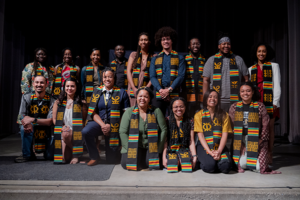Request Information
Ready to find out what MSU Denver can do for you? We’ve got you covered.

June 14, 2022
As Colorado prepares to celebrate Juneteenth as an official state holiday for the first time, I want to take a moment to reflect on the enduring importance of this day.
Metropolitan State University of Denver will be closed June 20, an official University holiday we established after the state legislature passed Senate Bill 139 creating the state holiday last month. I’m thrilled by the widespread recognition of this consequential day, which has been an important celebration for many Black Americans for decades.
Denver’s Juneteenth celebrations date to the 1950s in the Five Points neighborhood. As Russell Noles, the first Black chair of MSU Denver’s Board of Trustees, noted this year, “This holiday has been celebrated in Black communities for years, and Denver has one of the largest Juneteenth celebrations in the country. So this is a holiday that’s been around for a long, long time.”
Juneteenth commemorates June 19, 1865, the day that the last enslaved Black people were freed by federal troops in Texas, 2½ years after President Abraham Lincoln’s Emancipation Proclamation. As June 19 falls on a Sunday this year, we are observing the holiday Monday, and I encourage you to think about the significance of this celebration this weekend.
That lengthy interval between the formal end of slavery and the practical end years later resonates with me and can teach us a lot about injustice and inequity today. Author Clint Smith detailed the legacy of Juneteenth in his 2021 book “How the Word is Passed,” which examines how the story of American slavery is presented in various places around the country and world.
“(Juneteenth) is a reminder that each day this country must consciously make a decision to move toward freedom for all of its citizens, and that this is something that must be done proactively; it will not happen on its own,” Smith wrote. “The project of freedom, Juneteenth reminds us, is precarious, and we should regularly remind ourselves how many people who came before us never got to experience it, and how many people there are still waiting.”
American chattel slavery ended more than 150 years ago, but it endured for some 250 years before that and shaped our country as we know it. Its effects are still seen today in the form of wealth inequality, disparate health outcomes, academic-attainment gaps and more. As we look back on this historic holiday, let us remember that there is more to do and actively work toward truly fulfilling the freedoms established on Juneteenth so long ago.
Lastly, I want to thank the MSU Denver students who testified in favor of the bill through the student organization B L A C X E R A. Advocacy is critical to creating change. University leaders supported passage of the bill as well, and our trustees unanimously issued a resolution in favor of SB 139 too. As the University that educates the most Black students in the state, MSU Denver has an important role in serving Black Coloradans and will continue to work toward providing the best academic experience possible for its students.
Sincerely,
Janine Davidson, Ph.D.
President